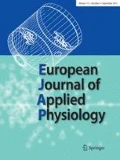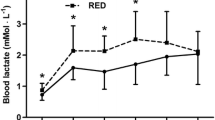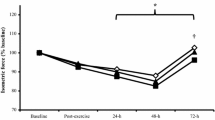Abstract
The effect of acute alcohol intake on muscular performance in both the exercising and non-exercising legs in the days following strenuous eccentric exercise was investigated to ascertain whether an interaction between post-exercise alcohol use and muscle damage causes an increase in damage-related weakness. Ten healthy males performed 300 maximal eccentric contractions of the quadriceps muscles of one leg on an isokinetic dynamometer. They then consumed either a beverage containing 1 g of ethanol per kg bodyweight ethanol (as vodka and orange juice; ALC) or a non-alcoholic beverage (OJ). At least 2 weeks later they performed an equivalent bout of eccentric exercise on the contralateral leg after which they consumed the other beverage. Measurement of peak and average peak isokinetic (concentric and eccentric) and isometric torque produced by the quadriceps of both exercising and non-exercising legs was made before and 36 and 60 h post-exercise. Greatest decreases in exercising leg performance were observed at 36 h with losses of 28.7, 31.9 and 25.9% occurring for OJ average peak isometric, concentric, and eccentric torques, respectively. However, average peak torque loss was significantly greater in ALC with the same performance measures decreasing by 40.9, 42.8 and 44.8% (all p < 0.05). Performance of the non-exercising leg did not change significantly under either treatment. Therefore, consumption of moderate amounts of alcohol after damaging exercise magnifies the loss of force associated with strenuous eccentric exercise. This weakness appears to be due to an interaction between muscle damage and alcohol rather than the systemic effects of acute alcohol consumption.
Similar content being viewed by others
References
Barnes MJ, Mündel T, Stannard SR (2009) Acute alcohol consumption aggravates the decline in muscle performance following strenuous eccentric exercise. J Sci Med Sport. doi:10.1016/j.2008.12.627
Barnett A (2006) Using recovery modalities between training sessions in elite athletes: does it help? Sports Med 36(9):781–796
Carson RG, Riek S, Shahbazpour N (2002) Central and peripheral mediation of human force sensation following eccentric or concentric contractions. J Physiol 539(3):913–925
Clarkson PM, Reichsman F (1990) The effect of ethanol on exercise-induced muscle damage. J Stud Alcohol 51(1):19–23
Cleak MJ, Eston RG (1992) Muscle soreness, swelling, stiffness and strength loss after intense eccentric exercise. Br J Sp Med 537(2):267–272
Cofán M, Nicholás JM, Fernández-Solá J et al (2000) Acute ethanol treatment decreases intracellular calcium-ion transients in mouse single skeletal muscle fibres in vitro. Alcohol Alcohol 35(2):134–138
Dartnall TJ, Rogasch NC, Nordstrom MA et al. (2009) Eccentric muscle damage has variable effects on motor unit recruitment thresholds and discharge patterns in elbow flexor muscles. J Neurophys. doi:10.1152/jn.91285.2008
Deschenes MR, Brewer RE, Bush JA et al (2000) Neuromuscular disturbance outlasts other symptoms of exercise-induced muscle damage. J Neurol Sci 174:92–99
Eston R, Peters D (1999) Effects of cold water immersion on symptoms of exercise-induced muscle damage. J Sports Sci 17:231–238
Gulick DT, Kimura IF, Sitler M et al (1996) Various treatment techniques on signs and symptoms of delayed onset muscle soreness. J Athl Train 31(2):145–152
Jönhagen S, Ackermann P, Ericksson T et al (2004) Sports massage after eccentric exercise. Am J Sports Med 32(6):1499–1503
Kraemer WJ, Bush JA, Wickham RB et al (2001) Influence of compression therapy on symptoms following soft tissue injury from maximal eccentric exercise. J Orth Sports Phys Ther 31(6):282–290
MacIntyre DL, Reid WD, Lyster DM et al (1996) Presence of WBC, decreased strength, and delayed soreness in muscle after eccentric exercise. J Appl Physiol 80:1006–1013
Nelson TF, Wechsler H (2001) Alcohol and college athletes. Med Sci Sports Exercise 33(1):43–47
O’Brien KS, Blackie JM, Hunter JA (2005) Hazardous drinking in elite New Zealand sportspeople. Alcohol Alcohol 40(3):239–241
O’Brien KS, Ali A, Cotter JD et al (2007) Hazardous drinking in New Zealand sportspeople: level of sporting participation and drinking motives. Alcohol Alcohol 42:376–382
Poulsen MB, Jakobsen J, Aagard NK et al (2007) Motor performance during and following acute alcohol intoxication in healthy non-alcoholic subjects. Eur J Appl Physiol 101:513–523
Prasartwuth O, Taylor JL, Gandevia SC (2005) Maximal force, voluntary activation and muscle soreness after eccentric damage to human elbow flexor muscles. J Physiol 567:337–348
Proske U, Morgan DL (2001) Muscle damage from eccentric exercise: mechanism, mechanical signs, adaptation and clinical applications. J Physiol 537(2):333–345
Racinais S, Bringard A, Puchaux K et al (2008) Modulation in voluntary neural drive in relation to muscle soreness. Eur J Appl Physiol 102:439–446
Reilly T (2003) Alcohol, anti-anxiety drugs and sport. In: Mottram DR (ed) Drugs in sport. Routledge, London, pp 258–287
Reilly T, Ekblom B (2005) The use of recovery methods post-exercise. J Sports Sci 23(6):619–627
Snow P, Munro G (2006) Alcohol (mis)use in metropolitan amateur football clubs. ACHPER Healthy Lifestyles J 53:7–11
Szabo G, Mandrekar P (2009) A recent perspective on alcohol, immunity and host defence. Alcohol Clin Exp Res 33(2):220–232
Tidball JG (2005) Inflammatory processes in muscle injury and repair. Am J Physiol 288:R345–R353
Valenzuela CF (1997) Alcohol and neurotransmitter interactions. Alcohol Health Res World 21(2):144–148
Wilcock IM, Cronin JB, Hing WA (2006) Physiological response to water immersion: a method of sport recovery? Sports Med 36(9):747–765
Conflict of interest statement
None.
Author information
Authors and Affiliations
Corresponding author
Additional information
Communicated by William Kraemer.
Rights and permissions
About this article
Cite this article
Barnes, M.J., Mündel, T. & Stannard, S.R. Post-exercise alcohol ingestion exacerbates eccentric-exercise induced losses in performance. Eur J Appl Physiol 108, 1009–1014 (2010). https://doi.org/10.1007/s00421-009-1311-3
Accepted:
Published:
Issue Date:
DOI: https://doi.org/10.1007/s00421-009-1311-3




